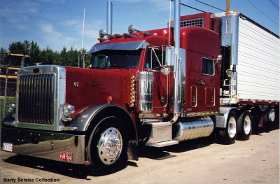Thinking Bout Buying A Used Truck & Leasing On Somewhere With Another Driver Driving It
Topic 9953 | Page 1

In my opinion, you would not be able to run one business and work a full time job simultaneously. When you buy a used truck, you buy someone else's problems. For the first two years of ownership, all of the kinks and quirks will surface. Unless you work on the truck yourself, mechanic labor rates (upwards of $80 hr) will eat you alive. But to answer your questions, general freight pays anywhere between $1 to $2 a mile plus fuel surcharge. Out of this, you would be responsible to pay insurance, driver, fuel, maintenance, federal tax, 2290 tax ($550), base plates ($1800) and possibly more depending on the carrier you sign with. An engine is pushing a rebuild ($15k to $25k) at 750,000 miles and in dire need at one million miles. Figure on driving 150,000 to 200,000 miles a year. Cost to run a truck is upwards of .80 cents per mile, ALL MILES.

In my opinion, you would not be able to run one business and work a full time job simultaneously. When you buy a used truck, you buy someone else's problems. For the first two years of ownership, all of the kinks and quirks will surface. Unless you work on the truck yourself, mechanic labor rates (upwards of $80 hr) will eat you alive. But to answer your questions, general freight pays anywhere between $1 to $2 a mile plus fuel surcharge. Out of this, you would be responsible to pay insurance, driver, fuel, maintenance, federal tax, 2290 tax ($550), base plates ($1800) and possibly more depending on the carrier you sign with. An engine is pushing a rebuild ($15k to $25k) at 750,000 miles and in dire need at one million miles. Figure on driving 150,000 to 200,000 miles a year. Cost to run a truck is upwards of .80 cents per mile, ALL MILES.
Man I must have been doing something right. When I had my own truck all my cost were only .50 cpm. But of course I know the industry and know how to cut cost without being cheap.
CPM:
Cents Per Mile
Drivers are often paid by the mile and it's given in cents per mile, or cpm.

Then instead of quoting me, why don't you give the man some of your miracle advice. There is no truck on the road being operated at .50 cents a mile...guaranteed!
Not so sure on those rebuild costs lol $15k would be on the high end, IMO. ya can buy longblocks for under $10k, most makes, cummins, mack, cats, detroits. In-frames usually book out at, or around 40 hours labor.....I miss the old days of rebuilding em :)
HOS:
Hours Of Service
HOS refers to the logbook hours of service regulations.
Just had my Cat rebuilt 3 weeks ago. Platinum, new oil cooler, turbos, a day harnesses, 4 year warranty, 25k.

Then instead of quoting me, why don't you give the man some of your miracle advice. There is no truck on the road being operated at .50 cents a mile...guaranteed!
Yes sir there is. When your working with a set fixed rate for everything. My cpm was $1.30 a mile on average. My fuel cost was .90 a gallon and with my fuel mileage always over 8 mpg the actual fuel cost was averaging around .24 to.26 per gallon. At the time the average national fuel surcharge was around .65 cpm which dropped my cost per fuel. Sometimes ,depending on weather and wind conditions my cpm for fuel was lower than .10 cpm.
Its not the point that yes a truck can be ran lower than .50 cpm(There are drivers doing everyday.Listen to Kevin Rutherfords show on the Road Dogg show). The point is it takes years of experience to develop the knowledge to know how to do it. Its not what you drive but HOW you drive that is the main factor but also having large company provided dealer and fuel discounts that makes up the lions share of the savings.
So please instead of saying it cant be done instead think and say on average that most trucks average their cost right around the .65 to .70 cpm but more than a few trucks just might operate at a lower cost due to very large volume discounts at large companies.
CPM:
Cents Per Mile
Drivers are often paid by the mile and it's given in cents per mile, or cpm.

I first bought an older (2008 ) truck last year, had 700K miles on it. Broke down all the time. so not only was I paying for repairs I was missing out on income I could have been earning while it was in the shop. I kept it for 5 months and traded up to a 2014 Freightliner with 100K miles on it. no breakdowns & great fuel economy. buy newer if you can swing it.

Then instead of quoting me, why don't you give the man some of your miracle advice. There is no truck on the road being operated at .50 cents a mile...guaranteed!
Yes sir there is. When your working with a set fixed rate for everything. My cpm was $1.30 a mile on average. My fuel cost was .90 a gallon and with my fuel mileage always over 8 mpg the actual fuel cost was averaging around .24 to.26 per gallon. At the time the average national fuel surcharge was around .65 cpm which dropped my cost per fuel. Sometimes ,depending on weather and wind conditions my cpm for fuel was lower than .10 cpm.
Its not the point that yes a truck can be ran lower than .50 cpm(There are drivers doing everyday.Listen to Kevin Rutherfords show on the Road Dogg show). The point is it takes years of experience to develop the knowledge to know how to do it. Its not what you drive but HOW you drive that is the main factor but also having large company provided dealer and fuel discounts that makes up the lions share of the savings.
So please instead of saying it cant be done instead think and say on average that most trucks average their cost right around the .65 to .70 cpm but more than a few trucks just might operate at a lower cost due to very large volume discounts at large companies.
BAM!
There is no way I can break down a P&L statement for an OO...yet, but, I do know business. Unless you are one of the connected few who have the ear of your local, district, state and federal government representatives, stay where you are and keep making that very good $$ as a LTL driver. Timing is everything and right now is not the time. Just my opinion though.
LTL:
Less Than Truckload
Refers to carriers that make a lot of smaller pickups and deliveries for multiple customers as opposed to hauling one big load of freight for one customer. This type of hauling is normally done by companies with terminals scattered throughout the country where freight is sorted before being moved on to its destination.
LTL carriers include:
- FedEx Freight
- Con-way
- YRC Freight
- UPS
- Old Dominion
- Estes
- Yellow-Roadway
- ABF Freight
- R+L Carrier
CPM:
Cents Per Mile
Drivers are often paid by the mile and it's given in cents per mile, or cpm.

BAM!
There is no way I can break down a P&L statement for an OO...yet, but, I do know business. Unless you are one of the connected few who have the ear of your local, district, state and federal government representatives, stay where you are and keep making that very good $$ as a LTL driver. Timing is everything and right now is not the time. Just my opinion though.
You are correct Rolling Thunder. Its not the time. Its what is called a "Trucking Companies Market" at this time in the industry. While the companies are hiring like mad and wanting drivers anyway they can get them the freight market is still recovering at the moment from the 2008/2009 crash ,though the prices are slowly moving up more towards a drivers market, the freight rate is just not there yet.
LTL:
Less Than Truckload
Refers to carriers that make a lot of smaller pickups and deliveries for multiple customers as opposed to hauling one big load of freight for one customer. This type of hauling is normally done by companies with terminals scattered throughout the country where freight is sorted before being moved on to its destination.
LTL carriers include:
- FedEx Freight
- Con-way
- YRC Freight
- UPS
- Old Dominion
- Estes
- Yellow-Roadway
- ABF Freight
- R+L Carrier
New Reply:
New! Check out our help videos for a better understanding of our forum features

















Preview:








 TT On Facebook
TT On Facebook
Been driving 9 yrs now. Wrk for a LTL carrier, home daily.. Wrk daytime hours.. Make very good $$.. Thinking bout buying a used truck & leasing on somewhere with another driver driving it, me keeping my current job.
Can I make money doing this?, is it worth it? I've done a lot of research & here it both ways... Fuel surcharge? I know what it is.. What's on average does it pay a mile?... I've researched % pay & milage pay, & pretty sure % pay is best... When looking at used trucks what's the milage I should stay away from?... I've seen many trucks under 20k with around 850-900k miles on them. Better to spend more $$, & buy newer? Thx....any help would be appreciated 😀
LTL:
Less Than Truckload
Refers to carriers that make a lot of smaller pickups and deliveries for multiple customers as opposed to hauling one big load of freight for one customer. This type of hauling is normally done by companies with terminals scattered throughout the country where freight is sorted before being moved on to its destination.
LTL carriers include: